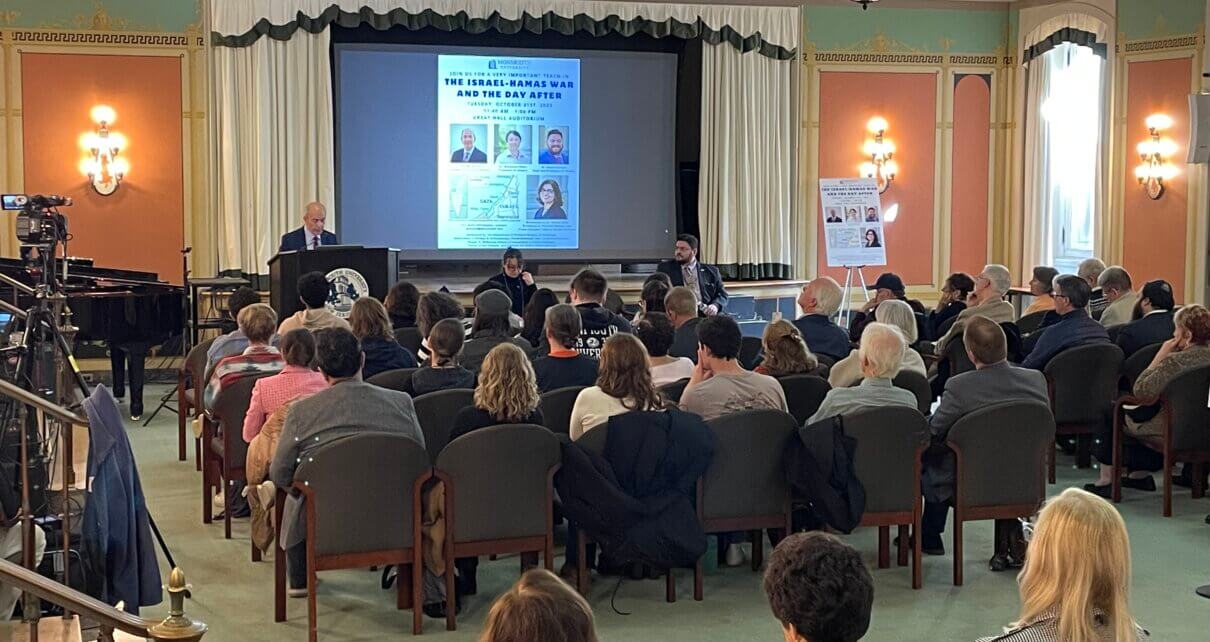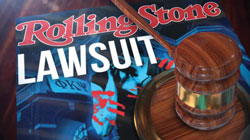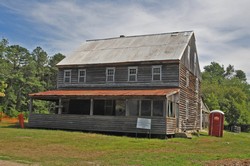Monmouth University scholars took the stage to discuss the situation in Israel and Gaza in a Teach-In titled, The Israel-Hamas War & The Day After, in the Great Hall Auditorium on October 31st.
With the recent intensity of the ongoing Israel-Hamas conflict, History and Political Science faculty found it to be important to educate students and other Monmouth University community members.
This event included an informative panel followed by a Q&A session. The panel consisted of a moderator, Professor of Political Science & Freed Endowed Chair in Social Sciences Dr. Rekha Datta, and panelists Professor of History Dr. Maryanne Rhett, Professor of Political Science Dr. Saliba Sarsar, and Dean and Professor of History Dr. David Golland.
With very few seats left empty, this event informed students, faculty, and community members on the conflict occurring in the Middle East. By starting with information on the history of the conflict, moving through the current events, and ending with the American perspective on the conflict, this panel was able to cover a large landscape.
“We were heartened to see the large turnout and extent of student participation,” said moderator, Dr. Datta. “At the conclusion of the event, several attendees came up to us, and many others reached out through email later, expressing gratitude for having a space and opportunity to learn more about the historical and factual details surrounding the crisis.”
While the University does offer classes with information relating to the Israel-Hamas conflict, such as Comparative Politics of the Middle East (PS-376), for many students, it can be difficult to find accurate information on the conflict and its’ history. This struggle makes events like this pivotal.
Nolan Doherty, an attendee of the Teach-In and current student in PS-376, said, “Events like these allow us to learn both sides. The panelists provided accurate and unbiased information throughout the panel and Q&A.”
Although this conflict is taking place in the Middle East, the Monmouth University community is and will continue to be impacted. Dr. Rhett said, “Monmouth University is a member of the global community. Not only do our students, faculty, and staff hail from all over the world, but we all live, work, and play in that global community.”
“I was really elated that so many people, students and staff, showed up and are interested in what’s going on,” said Dr. Sarsar, born and raised in Jerusalem. Similar to Dr. Rhett, he said that we are, “citizens of the world regardless, and if we are hurting in one part of the world, we need to empathize and figure out how we can help others elsewhere.”
He said that “the topic is complex” and that is why it is so crucial for people to learn and be encouraged to do their own research to find as many perspectives on the topic as possible. “We try to simplify to the best of our abilities so students can form an image of the human cost of war.”
During the Q&A, questions from the audience were at times pointed and heated. Several attendees seized the opportunity to instead express personal thoughts relating to the conflict, including the description of a child being “baked in an oven,” along with other gruesome details relating to the violence occurring in the Middle East conflict.
But for the most part, those in attendance took the opportunity to ask the scholars important questions. One student asked the question “Would you also say that the overwhelming support of world leaders, such as Biden giving billions to Israel, is enabling the far-right
government to keep bombing Gaza instead of searching for a more humanitarian and diplomatic solution,” which was followed by the applause of many, both students and faculty.
“Not only was the turn out substantial, but the questions and conversations sparked by the discussion were indicative the myriad of viewpoints which come with the topic,” said Dr. Rhett.
Dr. Golland said that the Teach-In was a success in many ways. “The people who needed to say things were able to do so, and I think for those people in particular I think it was successful.”
“There have been acts of violence around the country on college campuses in discussions of the Israel-Hamas war,” said Dr. Golland. He said that in addition to the event being safe and violence-free, both panelists during the first portion of the event and students during the Q&A session afterward were not interrupted when speaking,
Dr. Golland described Monmouth University students as “the leaders of tomorrow” and that is why events like these are so important.
Similarly, Dr. Rhett said that while “We may not be able to call diplomatic negotiations into existence at the moment, our community will create the leaders who will be able to do so in the future.
Overall, moderator Dr. Datta, and panelists Dr. Rhett, Dr. Sarsar, and Dr. Golland, all expressed that the event was a success, both in number of attendees and information shared.
This event was sponsored by the Department of Political Science & Sociology, the Department of History & Anthropology, the Freed Endowed Chair in Social Sciences, the Wayne D. McMurray School of Humanities & Social Sciences, the Office of the Provost, and the Institute for Global Understanding.




